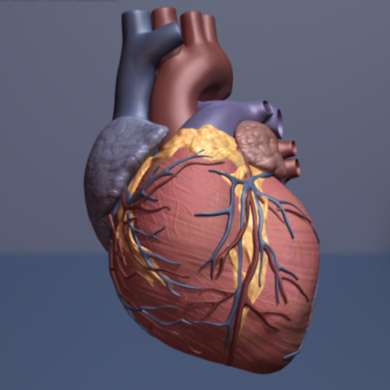Heart muscle made from stem cells aid precision cardiovascular medicine, study shows

Heart muscle cells made from induced pluripotent stem cells faithfully mirror the expression patterns of key genes in the donor's native heart tissue, according to researchers at the Stanford University School of Medicine. As a result, the cells can be used as a proxy to predict whether a patient is likely to experience drug-related heart damage.
The discovery validates the use of such cells to test the potential cardiotoxicity of certain drugs and to devise new therapies for conditions like cardiomyopathy. Pinpointing people who are likely to suffer heart damage before these people undergo treatment could increase the safety profile of many medications, the researchers believe.
"Thirty percent of drugs in clinical trials are eventually withdrawn due to safety concerns, which often involve adverse cardiac effects," said Joseph Wu, MD, PhD, director of Stanford's Cardiovascular Institute and professor of cardiovascular medicine and of radiology. "This study shows that these cells serve as a functional readout to predict how a patient's heart might respond to particular drug treatments and identify those who should avoid certain treatments."
Wu is the senior author of the study, which will be published online Aug. 18 in Cell Stem Cell. Cardiovascular medicine instructor Elena Matsa, PhD, is the lead author of the research.
Testing the tissue
The ability to create stem cells from easily obtained skin or blood samples has revolutionized the concept of personalized medicine and made it possible to create many types of human tissue for use in the clinic. Researchers have wondered, however, whether the process of creating stem cells, and subsequently coaxing those stem cells to become other tissues, might affect the patterns of gene expression and even the ways the specialized cells function. If so, these changes could limit their clinical usefulness.
Matsa, Wu and their colleagues created heart muscle cells, or cardiomyocytes, from iPS cells from seven people not known to have genetic predisposition to cardiac problems. They sequenced the RNA molecules made by the heart muscle cells to learn which proteins the cells were making, and how much. They then compared the results within individuals—looking at the gene expression patterns of cardiomyocytes derived from several batches of iPS cells from each person—as well as among all seven study subjects.
They also investigated how the cardiomyocytes from each person responded to increasing amounts of two drugs, one called rosiglitazone that is sometimes used to treat Type 2 diabetes and another called tacrolimus that serves as an immunosuppressant to inhibit the rejection of transplanted organs. Each of the two drugs has been associated with adverse cardiac effects in some people, but it has not been possible to predict which patients will experience heart damage.
"We found that the gene expression patterns of the iPS cell-derived cardiomyocytes from each individual patient correlated very well," said Matsa. "But there was marked variability among the seven people, particularly in genes involved in metabolism and stress responses. In fact, one of our subjects exhibited a very abnormal expression of genes in a key metabolic pathway."
Identifying an unusual response
Heart muscle cells from this person, the researchers found, responded differently than the others to exposure to rosiglitazone. Concerns about its effect on cardiac function have caused the drug to be withdrawn from the market in Europe and have strictly limited its use in the United States.
"This person's cells produced abnormal amounts of reactive oxygen species, were unable to regenerate their mitochondria and contracted much more weakly when exposed to rosiglitazone than cells derived from the other subjects," said Matsa.
Although the researchers were unable to identify a specific genetic mutation likely to cause such an outcome, they were able to pinpoint an important metabolic pathway involved in the response to the drug by comparing the subject's gene expression profile with that of the others whose cells were unaffected. They were also able to correct the defect by using a genome editing technique to boost the expression of a gene in the pathway and restore normal function.
Finally, although the researchers showed that meaningful variability exists in the gene expression patterns of the seven individuals, they couldn't yet be certain that the iPS-derived cardiomyocytes faithfully replicated each person's native heart tissue. To investigate, they created iPS cells from another three people who had undergone either heart biopsies or transplants. They then compared the iPS-derived cardiomyocytes with the matching native heart tissue and confirmed that the gene expression patterns correlated in many significant ways—particularly for genes involved in metabolic pathways critical to cardiac function.
"Many people talk about precision medicine or precision health, but there are only few examples of how to carry it out in a clinically meaningful way," said Wu. "I think the patient-derived iPS cell platform gives us a surrogate window into the body and allows us to not only predict the body's function but also to learn more about key disease-associated pathways."
















